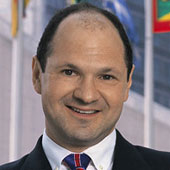Global Safety Worries: The Moscow View
Why does Moscow all of a sudden feel safer than Washington, DC?
March 29, 2003
Russia is still going through a severe social crisis unleashed by the collapse of communism in 1991. You can see many signs of social collapse in the streets of Moscow — even though the capital is a remarkably clean and prosperous city, compared to the rest of Russia.
Ever since the fall of the Soviet Union a dozen years ago, Russia has had to deal with a prolonged crime wave. Moscow's murder statistics now rival some of the worst cities in the developing world.
Robberies, muggings and pointless beatings on the subway and in the entrance halls of apartment buildings are commonplace.
And this is only the tip of an iceberg. Russians drink a lot, and even though no alcohol at all is tolerated behind the wheel, plenty of them drive drunk — making sidewalks and roads alike a very real danger zone.
Besides, even sober Russians driving fancy new cars on potholed city streets at 100 miles per hour are a menace to other drivers and pedestrians.
Then there is an AIDS epidemic, widespread addiction to hard drugs and a strain of antibiotics-resistant tuberculosis sweeping the country all the way from Russia's prisons.
In addition, Moscow is full of refugees from other parts of the country and parts of the former Soviet Union, fleeing economic collapse and local political conflicts. These people, too, present a rife milieu for criminal activity.
Then, of course, there is the omnipresent Russian mafia. And, as in other European cities, there are soccer hooligans, who regularly harass passengers on the subway after matches.
These dangers explain the real-life background of a statistical table published in the Economist magazine a few months ago. It warned that a Russian is the most likely to suffer a premature death among some 30 nations surveyed.
Now what about the police? Aren't they ready to help — and to quell all those dangers and disturbances? Why, the cops in Moscow are the most dangerous of all.
They sell their services for pay — so that you can get your business rival jailed on trumped-up gun possession charges, for instance, for just a few hundred bucks. And while they await the big payouts, the policemen also like to shake down ordinary citizens during routine document checks.
As if all of this were not enough, consider the terrorist threat. Russia has fought two wars against Chechnya, its independence-minded region in the Caucasus. There were several brutal terrorist explosions in recent years.
In October 2002, shortly after I arrived in Moscow, a group of Chechens took hostage an entire theater — performers, musicians, the audience and all.
After a tense standoff, it had to be stormed by Russian commandos — with significant loss of life among the audience members.
So, even without the terror incident, you must admit that I was somewhat justified to be concerned when I went to spend a few months of my life in Moscow.
True, I had grown up there, but left in 1975 to immigrate to the United States. At the time, Moscow streets might have been safer, but there were other safety concerns, stemming from the government's arbitrary treatment of its citizens.
To my surprise, however, after arriving in Moscow, I found myself worried more about my friends and family in Washington — where I went to graduate school and still visit regularly — and New York, where my family lives.
Of course, it sounds strange. After all, Washington is the capital of the most powerful nation modern history has known.
Americans spend nearly $400 billion a year on defense — almost as much as the rest of the world combined. It not only has all those nuclear weapons and the top-notch conventional military force. It is also the richest, most advanced economy on earth.
Yet, last fall, I kept worrying about sniper attacks that terrorized Washington and its suburbs. Then, there was the daily threat of terrorism — which of course applies to New York as much as to Washington.
On the news, I get stories about Code Orange terrorist warnings issued by the U.S. Department of Homeland Security. There are also many reports of heinous acts planned — fortunately none of which have materialized, as yet.
And now comes the war in Iraq and another threat of terror, this time from Saddam Hussein's agents and his supposed al Qaeda friends.
My U.S.-based mailbox is clogged with offers of gas masks imported from Israel and exotic drugs that are supposed to counteract the effects of biological weapons and radiation.
So, I now find myself routinely worrying about the safety of my family, friends and colleagues in Washington and New York City.
Clearly, something or somebody must have turned the world on its head — if Moscow all of a sudden feels safer.
Read previous
Not Enough Oil in Iraq
March 28, 2003
